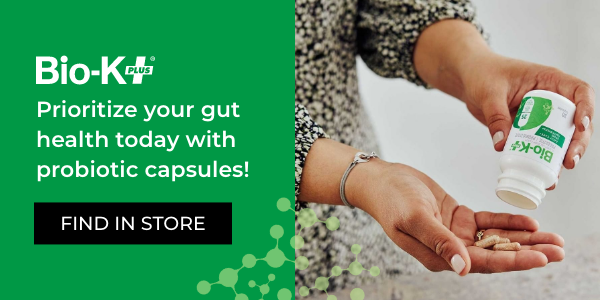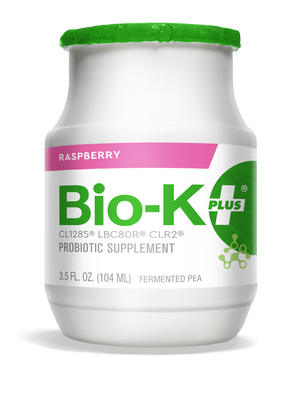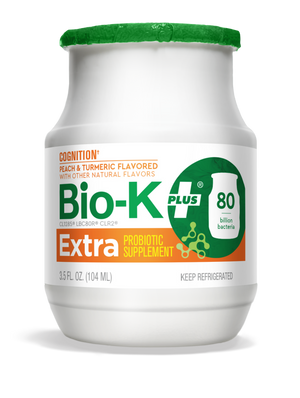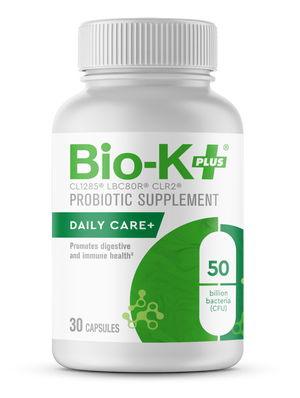Should You Take A Probiotic Every Day?
Have you ever tried making sourdough bread? If you have, you understand the importance of feeding your starter every day. Providing your gut with probiotics is very similar. If you do not feed your gut daily, you will not get the desired result. In this article, we will explain why you should talk to your doctor about taking daily drinkable probiotics or probiotic capsules, how you should take that probiotic, and how long you should be taking them. Follow along with our “starter” probiotic recipe below.
Why should I take a probiotic?
Your body does not make probiotics on its own. Your gut is a combination of good bacteria and bad bacteria. Gut dysbiosis comes from several different factors, including diet choices, illnesses, antibiotics, and other medicines you are prescribed, chlorine in the drinking water, contraception, and stress from our daily lives. Many of these factors cannot be easily removed, so the addition of good bacteria is necessary to regain balance in our gut.
Wondering what are probiotics’ benefits? Probiotics are an easy way to regain that balance. By adding a probiotic supplement that your doctor approves to your daily routine, your body will have help countering harmful bacteria in your gut.
Why should I take a probiotic every day?
So, should I take probiotics everyday? This question brings us back to your sourdough starter example. When keeping a starter, it is essential to feed it daily to help the healthy bacteria grow and strengthen the yeast. If you get stop feeding it, your yeast will lose its potency, and, in some cases, a mold will grow on top of the starter, leading you to start over from scratch.
Science has shown that discontinuing taking care of your gut microbiome can have the same effect on your body. The benefits of probiotics for women, specifically, have been studied to show why probiotics should be taken every day. In one study, women were asked to take two specific strains of Lactobacillus; rhamnosus and reuteri, and they were monitored for the impact the strains had on their vagina. After only seven days, the strains were found in the vaginas of women taking probiotics.
The next step of the study was for some women to stop taking the probiotic daily. Once these women stopped taking the probiotic every day, the strains exited the body within a week1. This quick transformation shows that probiotics did not hang out in their body for long once they stopped ingesting them.
Is it safe to take a probiotic every day?
If you’re asking, “Can you take a probiotic everyday?”, the answer is yes. Probiotics are a natural supplement, not a medicine.
So, is there a chance for to have an overdose of probiotics? It is not possible to overdose to the point of death on probiotic food or supplements. Common side effects of probiotics are gas, bloating, and nausea. Gas is the most common, and one that many may get when first starting on daily probiotic supplements.
Your gut is experiencing changes in bacteria levels, and the gas is a sign of those changes. In most cases, gas from probiotics wears off quickly as your body gets used to the changes, but if indigestion and other problems persist, it is recommended you decrease the dosage and consult with your health care professional.
What are things to consider when taking probiotics?
Probiotics are safe for most people, but those with a weakened immune system or those starting chemotherapy should consult their doctor before beginning a probiotic supplement. Although there are few dangers for most people, it is vital to choose a probiotic that stays alive and will reach your digestive system intact so it can have the best effects. Bio-K+® is FDA regulated, and our daily supplements have a special coating to make sure they survive the passage through the stomach.
How long should I take a probiotic for?
The answer to this depends on your condition. In the cases of diarrhea caused by antibiotics, or other short-term illnesses, a probiotic will quickly have the desired effect, and many stop taking it after the issue is resolved. In other cases, the medical problem is long-term and probiotic use helps keep it under control. A report in the August 2017 issue of American Family Physician notes it is best to take probiotics for constipation as long as the symptoms persist.
You could be surprised at how long it takes probiotics to make improvements that stick to your gut. When scientists looked at probiotics’ impact on general gut health, they found it took longer than studies that showed improvements for diarrhea relief. A study showed that drinking Lactobacillus casei, Lactobacillus paracasei, and Lactobacillus fermentium significantly decreased respiratory infections and flu-like symptoms after 12 weeks of daily use. In another study, after only two days of rehydration therapy and probiotics, the frequency of subjects’ diarrhea attacks significantly decreased3. This is a perfect example of how your end goal plays a large part in how quickly and effectively a probiotic will have the desired effect. The use of probiotics is well accepted by doctors when relieving long-term medical issues.
Do I have to take a probiotic every day?
The effects of probiotics can be amazing, but they are also short-lived. Studies, like those above, are showing that once subjects stop using probiotics, the beneficial effects are gone in a short time. Once you stop taking a probiotic, your gut will go back to the way it was before, depending on your condition and your own gut microbiota.
Balancing the good bacteria and bad bacteria in your gut can be difficult. Even in healthy people, outside factors can disrupt the balance and add harmful bacteria to your gut. If the number of good bacteria is less than the harmful gut bacteria, you will start to feel unhealthy. To keep that delicate balance, daily usage of probiotics can make a big difference for some people. Finding a probiotic supplementation that works with your lifestyle and health issues can provide extra support in your fight to stay healthy.
How should I take a probiotic?
The three most important things to think of when searching for the best probiotic are:
- whether you are taking it for the right condition
- using the right microbe for your condition
- taking the correct dosage.
As we learn more about probiotics, scientists are discovering more conditions where probiotics can be beneficial. Still, probiotics are not a cure-all and work best when combined with other therapies. It is important to consume probiotics that have been proven to work for your condition.
.Probiotics with the Lactobacillus probiotic strain have been involved in several studies. They have shown to help individuals with digestive issues, eczema, allergies, vaginal infections, diabetes, high cholesterol, arthritis, and airway infections4.
Determine the correct dosage
In each of these cases, it is essential to use the correct dosage of probiotics to have the best effects. More CFUs are needed to regain a healthy gut after recovering from an illness or antibiotic use, but as your digestive health improves, a lower usage is recommended. Bio-K+® ExtraCARE dietary supplements start at 80 billion CFUs and are used to maximize the intake of healthy bacteria.
We recommend starting with the daily use of this supplement when first relieving an issue with your gut. As your digestive health improves, our 50 billion DailyCARE+ supplements can help you continue that progress with a 30 or 60-day package. Once you are starting to feel better and are ready to keep the beneficial bacteria in your gut balanced for good, we move you to our 30 billion DailyCARE package. This supplement is meant to promote digestive and immune health.
In addition to finding the right probiotic and daily usage for your condition, it is important to combine that probiotic with food that helps it do its work. Some probiotics can work without food, but some of the most common probiotics, Lactobacillus and Bifidobacterium, will work best when taken up to 30 minutes before a meal5. However, It depends on the probiotic supplement.
Choose the right probiotic supplement for you
It is best is to verify with the specific probiotic company. With Bio-K+® probiotics, you can take your daily probiotics with or without food. The good bacteria in the fermented foods have a protective and nourishing environment. The live bacteria in the capsules are protected from the gastric acidity by a targetted release technology, which allow the live bacteria to be released in the intestines. Don't mix your probiotic with warm food and do not cook it. The bacteria are sensitive to the temperature.
Prebiotics feed microorganisms in your gut, have a synergistic effect on Probiotics. Prebiotics are found in high-fiber, whole-grain foods as well as bananas, onions, asparagus, artichokes, and garlic. This high-fiber food feeds the good bacteria in your gut and compliments the probiotic as it balances your digestive system.
Conclusion
Much like feeding the starter of your sourdough recipe, the bacteria in your gut and health of your digestive and immune system is a balancing act. You should consult with a health care professional to choose the right probiotic for your conditions and the correct usage to help you keep it in check.
There are no firm rules, but a knowledge of how your gut is feeling will help you in your decisions on what works best for you. The long-term use of probiotics is completely safe for most people, and the continued use of a supplement will make the balancing of good and bad bacteria much easier. Remember, outside factors can add to the harmful bacteria in your gut and your starter dough, so a little help from the other side is always welcome.
Sources:
1) “Is it ok to take probiotics every day?” Probiotics Learning Lab, https://www.optibacprobiotics.com/uk/learning-lab/about/probiotics/can-i-take-probiotics-every-day.
2) “How Often to Take Probiotics” LiveStrong.com, https://www.livestrong.com/article/385558-how-often-to-take-probiotics/.
3) “How Long Does It Take for Probiotics to Work?” Healthline, https://www.healthline.com/health/probiotics-and-digestive-health/how-long-does-it-take-for-probiotics-to-work#research.
4) “Lactobacillus” MedlinePlus, Lactobacillus acidophilus: MedlinePlus Supplements
5) “When’s the Best Time to Take Probiotics?” Healthline, https://www.healthline.com/nutrition/best-time-to-take-probiotics#bottom-line.






